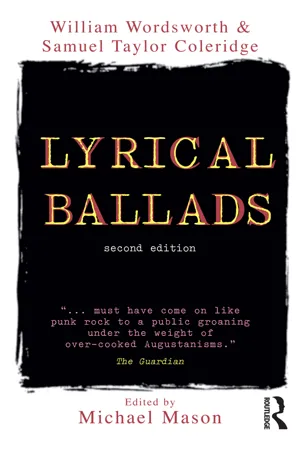![]()
Lyrical Ballads
with
Pastoral
and other poems
by W. Wordsworth
Quam nihil ad genium, Papiniane, tuum!
Epigraph. The point of the epigraph is complex. The quotation is originally from the sixteenth-century Dutch poet Janus Dousa the Elder, but was known to Wordsworth and Coleridge from its citation by the seventeenth-century English jurist John Selden in the introduction to Michael Drayton’s Poly-Olbion (1613). In that context it may be translated as ‘absolutely worthless in comparison with your genius, Papinian!’, and is Selden’s way of contrasting true/classical with false/mediaeval learning and learned language (Papinian himself was a celebrated jurist of classical Rome). But Wordsworth and his circle (to judge by a use of the quotation in Coleridge’s notebook, dated 4 March 1805) took the words, perhaps playfully, in a different sense, as meaning something like ‘worthless and insignificant according to your taste, Papinian!’. And Garrod (1923: 152) suggests that there is also here a playful misunderstanding of ‘Papinian’ to mean ‘Popean’ (in reference to the poet Alexander Pope).
Expostulation and Reply
Composed late May or early June 1798. The text was not altered. See the Advertisement (p. 35) for Wordsworth’s claim that this and the following poem sprang from a conversation with a friend who was too attached to ‘modern books of moral philosophy’. In literal fact this friend may have been William Hazlitt, who is known to have got into ‘metaphysical argument’ with Wordsworth at this date (Howe 1930–4, XVII, 119). But the setting is emphatically Cumbrian (see l. 13) and the ‘good friend’ the Matthew persona (see p. 288 below). For the significance of the narrator’s advocacy of a phenomenologically primitive condition of pure sensation (with a characteristic accompanying personification of the natural world), see General Introduction, p. 19.
‘Why, William, on that old grey stone,
Thus for the length of half a day,
Why, William, sit you thus alone,
And dream your time away?
‘Where are your books? – that light bequeathed (5)
To beings else forlorn and blind!
Up! up! and drink the spirit breathed
From dead men to their kind.
‘You look round on your mother earth,
As if she for no purpose bore you; (10)
As if you were her first-born birth,
And none had lived before you!’
One morning thus, by Esthwaite Lake,
When life was sweet, I knew not why,
To me my good friend Matthew spake, (15)
And thus I made reply:
‘The eye it cannot choose but see;
We cannot bid the ear be still;
Our bodies feel, where’er they be,
Against, or with our will. (20)
‘Nor less I deem that there are powers
Which of themselves our minds impress;
That we can feed this mind of ours
In a wise passiveness.
‘Think you, mid all this mighty sum (25)
Of things for ever speaking,
That nothing of itself will come,
But we must still be seeking?
‘– Then ask not wherefore, here, alone,
Conversing as I may, (30)
I sit upon this old grey stone,
And dream my time away.’
28. still: always, continually (as often in LB).
30. Talking haphazardly, but perhaps, as a result, in a more inspired way. Wordsworth found it interesting that, as he told Isabella Fenwick, the poem was ‘a favourite among the Quakers’. Quaker worship is notable for its informal and spontaneous character.
The Tables Turned
An Evening Scene, on the same Subject
Composed late May or early June 1798. Opening stanza rearranged after 1815. Evidently a companion to the previous poem, but the rhetoric of this narrator is not the same as that of ‘William’ replying earlier to the ‘expostulation’; it is both more colloquial and more ambitious in certain phrasings, and (in keeping with the idea of ‘tables turned’) owes something to the idiom of ‘Matthew’.
Up! up! my friend, and clear your looks;
Why all this toil and trouble?
Up! up! my friend, and quit your books,
Or surely you’ll grow double.
The sun, above the mountain’s head, (5)
A freshening lustre mellow
Through all the long green fields has spread,
His first sweet evening yellow.
Books! ‘tis a dull and endless strife:
Come, hear the woodland linnet, (10)
How sweet his music! On my life
There’s more of wisdom in it.
And hark! how blithe the throstle sings!
And he is no mean preacher.
Come forth into the light of things, (15)
Let Nature be your teacher.
She has a world of ready wealth,
Our minds and hearts to bless –
Spontaneous wisdom breathed by health,
Truth breathed by cheerfulness. (20)
One impulse from a vernal wood
May teach you more of man,
Of moral evil and of good,
Than all the sages can.
Sweet is the lore which Nature brings; (25)
Our meddling intellect
Misshapes the beauteous forms of things;
– We murder to dissect.
Enough of Science and of Art;
Close up these barren leaves; (30)
Come forth, and bring with you a heart
That watches and receives.
4. The line is cited as vulgar in its phrasing by Francis Jeffrey (Edinburgh Review I, 1802, p. 68). ‘Grow double’ means ‘become doubled up’.
10. the woodland linnet: twitting Wordsworth with the observation that linnets are not woodland birds (e.g. Moorman 1957: 380) may be inappropriate if the vegetation envisaged here is that occupied by linnets in ‘Poems on the Naming of Places’ I, ll. 31–3 (p. 324). There are literary precedents for the association of linnets and woods in Mark Akenside (Pleasures of the Imagination, 1772, II, ll. 176–7) and James Beattie (The Minstrel, 1771–4, 1, 41–2). ‘Linnet of the grove’ occurs in Ch. 22 of Samuel Johnson’s Rasselas (1759) in a passage that may have had a general influence on this poem.
28. Compare Pope, ‘Epistle to Cobham’, ll. 29–30.
29. Science … Art: probably overlapping rather than antithetical terms, for learning generally.
Animal Tranquillity and Decay
A Sketch
Entitled ‘Old Man Travelling’ in 1798 (with later title ...
